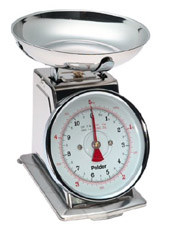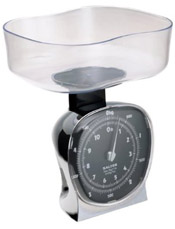The Essential Kitchen: Scales
Why Weigh Ingredients?
Some of us cook entirely by feel and our own culinary instincts. But many of us want accurate controls when putting dishes together. If that's you, a kitchen scale could make you a happier, and better cook.
Unlike professional chefs who routinely use scales to measure ingredients by weight instead of volume, most home cooks instead use measuring cups and spoons. Of course, restaurant kitchens make bigger quantities than we do in our kitchens, making weighing a practical matter (who wants to measure 40 cups of chopped onions?). But the primary reason chefs measure by weight is to be consistent and have control.
If you measure only by volume -- with a cup or a measuring spoon -- it is possible to have discrepancies caused by the weather, the altitude of your location, the ingredients themselves, or the tools you use. And these discrepancies can mean a minor -- or major -- difference in your results.
Does that mean a cup isn't a cup? Yes, that's exactly what I mean.
Dry ingredients can be affected by altitude or weather. On a dry or humid day, or whether you're in Denver versus Boston, a cup of flour can vary in weight by 100 percent! So if you're making a favorite family recipe for coffee cake and you measure two cups of flour, your result may be different from what you remember.
Here's a non-baking example: a cup of Parmesan cheese that has been grated using a Microplane rasper will be notably -- easily 100 to 200 percent -- less in weight than a cup of cheese grated in a food processor or using the large holes of a box grater. So all cups of grated cheese are not the same and in a recipe like macaroni and cheese, this can be ruinous.
If you want to make your own charcuterie, such as buying pork belly to make your own bacon, or grinding your own sausage or paté, a food scale is essential. There's simply no other accurate way to know that the ratios of ingredients are correct because you need to measure before you cut or grind the meats.
When brining your Thanksgiving turkey or pickling vegetables, the size of the grain of the salt can vary enough to impact the effectiveness of the brine. For that matter, any recipe that uses salt beyond a pinch can be perfectly flavored or inedible if you use too much or too little salt: a teaspoon of fine grained sea salt is, by weight, much more salt than a teaspoon of coarse grained kosher salt.
Other Reasons For Weighing
Cookbooks don't make it easy for those of us who want to weigh and not just measure. It's a Catch-22: cookbook authors and publishers don't list ingredient weights because they believe home cooks don't have scales; home cooks don't buy scales because our cookbooks don't give us weights.
Still, there are reasons to do our own computations to convert volume to weight and to think in a new way about measuring the foods we cook. The computations aren't difficult; many cookbooks have conversion charts and Google can lead you to dozens of resources for converting measurements for a specific ingredient like salt, butter or sugar.
Okay, so you're not a baker, nor making your own charcuterie. There are good reasons to use a scale:
- A scale is a budget tool. Instead of buying a single 10 oz. box of instant couscous, buy it in bulk at a natural foods store or grocer and then measure out the bulk quantity into recipe-sized portions weighed on a food scale. Your savings will be huge.
- You can do the same with meat. Buy a large roast when it's on sale and cut it into meal-sized portions. Weigh each before packing into a freezer bag, writing its weight on the bag so that you'll later know how long to cook it.
- Making pizza or pastry dough? Make a larger amount, weigh it, and cut it into equal sized portions for another time. Maybe your eye is accurate enough to do this without a scale. Mine isn't -- I always cut one piece bigger than the other.
- One of the best uses of a kitchen scale is to measure chocolate. Bars of chocolate may come pre-scored but inevitably the little squares don't add up to what you need for your brownies and estimating means you're taking a risk with the recipe's most important ingredient. With a kitchen scale you can buy bars or bags of chips and weigh precisely what you need.
- Weighing ingredients will make you more mindful of what's going into your food. If a recipe calls for "a stick of butter," reading the stick's wrapper will let you know it's a quarter pound, or four ounces.
- Using a scale will help you become familiar with the ratios we use in most of our cooking. Michael Ruhlman has done an entire (and excellent) book on this subject, aptly titled Ratio: The Simple Codes Behind the Craft of Everyday Cooking. And one of the most popular postings on e-Gullet.org is its Kitchen Scale Manifesto.
- You can measure things like coffee and tea -- you get to know exactly how much you need for the best result and thus, waste less.
- Finally, kitchen scales are not only a cooking tool but also a nutrition tool. It's indispensible if you're on a food program with precise portion control, whether it's Weight Watchers or you're cooking for a diabetic.
Today's Kitchen Scales
I love things that look like what they are and a classic mechanical scale, with its boxy base and large dial, can be a thing of beauty to showcase on a kitchen counter. But if you're short on space, a mechanical scale is about as clumsy a tool as you can own.
Like most technology, kitchen scales have come a long way and electronic digital scales are perfect for the home cook. They are compact in size, making them very city kitchen friendly, and their electronics are more sensitive than any mechanical scale, measuring amounts as small as .5 ounce, or one gram.
Plus they're value priced: good ones cost about $25.
If you don't use a scale, you may not be familiar with this kitchen term: "tare." It's a verb that means to adjust a scale's computation to account for the container that holds whatever you're measuring. Butchers or delis "tare" when they adjust their scales to minus-out the weight of the package that holds your purchase; for example, a plastic container of chicken livers. Today's electronic home scales tare with the touch of a button to subtract the weight of your mixing bowl as you add ingredients to it.
I was recently sent an electronic scale to product test and opened the box with skepticism. I'm a creature of habit and love my shiny chrome mechanical Polder scale, even with its limitations (hard to store and it doesn't measure amounts less than two ounces). The one I was sent is made by EatSmart, a small company in New Jersey, and after cooking with it, I may just put my Polder into storage.
This model was the Precision Pro Digital Kitchen Scale. It costs $25 either at Amazon or by buying direct from EatSmart. Here's what I liked about it:
- The digital display is really easy to read and measures four ways: ounces, pounds, grams and kilograms.
- With a single click the computations convert Metric to Imperial (grams to ounces) and visa versa.
- It has a sleek appearance, is compact enough to store in my space-compromised kitchen, and it's made of hard plastic, making it easy to wipe clean.
- I can add a large mixing bowl to its disc surface and press a button to tare the bowl's weight.
- Mine is white but the company makes the scale in five colors.
- It measures amounts as small as one gram (a half ounce) up to eleven pounds.
- It has a three-minute auto-shutoff feature, enough to weigh multiple items while you're in the midst of cooking without shutting off, but if you forget, it turns off automatically.
- It's said to run for a year on two AAA batteries (I haven't used mine yet for a year so I can't vouch for this).
- It has a calorie computation feature that lets you calculate the calories, by weight, in about 1,000 foods (the scale comes with a guidebook for this function).
Other companies that make very good products that are similar to EatSmart's Precision Pro model include Salter, Polder, Oxo, Taylor, Cuisinart, and several imports.
A final comment about using a kitchen scale. This is the kind of tool that you either become habituated to using, or else it will disappear into a cabinet until you give it away saying, "why did I ever buy this?" So if you do add a scale to your city kitchen, leave it visible so that you remember to use it.
A scale isn't for everyone, but like a good chef's knife, it increases your control, which in turn, can actually make you a better cook.




